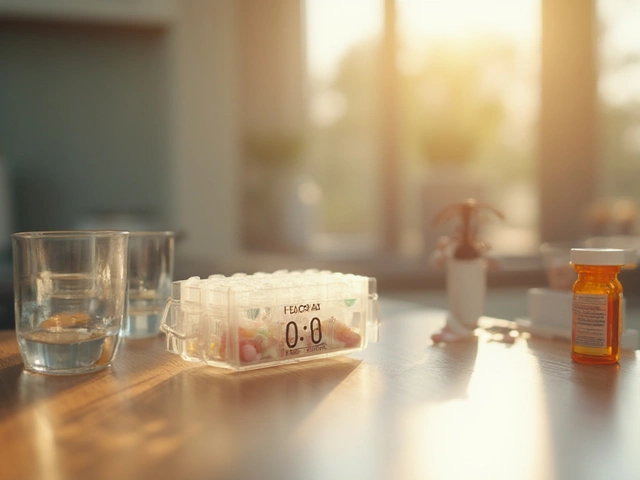Sometimes stress sneaks up—like misplacing your wallet at the worst moment. Other times, it’s more of a constant hum, always there in the background. Did you know that nearly 75% of adults say stress messes with their lives? You’re definitely not alone if you’re hunting for solutions outside a doctor’s office. When deadlines, relationships, or just the wild pace of 2025 get overwhelming, a lot of folks look to over-the-counter (OTC) stress relief options before anything else. The trick is figuring out what actually helps, instead of wasting cash on fancy bottles that deliver nothing but placebo.
Understanding How OTC Options Work for Stress
Stress triggers that ancient fight-or-flight system, pumping out adrenaline and cortisol. Back in the caveman days, this helped us dodge sabertooth tigers. Today, it just means tense shoulders, tight jaws, and trouble sleeping. OTC options don’t erase stress—nothing really does, unless you have a magic wand. What they can do, though, is help your brain and body chill out enough to function: calming your heart rate, helping you sleep better, or just turning down that mental static for a while.
A lot of these products tap into either traditional herbal medicine or vitamins thought to support the nervous system. Others target anxiety’s side effects—think trouble sleeping or muscle tension—more than stress itself. If you’re picturing a guy meditating cross-legged surrounded by incense, toss out the stereotype. Most OTC options are basic enough for any regular, busy person to use. Some focus on supplements with formulas like magnesium, L-theanine (the stuff in green tea), or valerian root. Others are blends marketed as "stress support" pills with a pile of herbs and vitamins mixed in.
If insomnia or headaches are your main problem, there are products on the pharmacy shelf designed especially for that. Melatonin, for example, is a go-to for sleep—just don’t expect it to perform miracles if your nightly stress is more about racing thoughts than a messed-up sleep schedule. CBD gummies and drinks exploded in popularity in the late 2010s, and you’ll see them everywhere these days. The evidence is still a bit shaky, but some people swear they help with tension and mood swings.
It’s all about bioavailability (how much your body actually absorbs) and how you react to specific ingredients. Age, weight, metabolism, and whether you take other meds makes a big difference. What calms your buddy might make you groggy or give you a stomachache. If you want fast, temporary results, some folks try old-school antihistamines (like diphenhydramine), but be careful—these make most people drowsy and aren’t a long-term fix.
In short, OTC options are about dialing down the symptoms of stress, not solving your boss or your bills—but they can be a handy part of your toolkit.
The Most Common OTC Stress Relief Supplements
The pharmacy shelves are stacked with all kinds of "chill out" capsules, teas, and gummies right now. So which ones are actually worth your attention? Some supplements have a record of helping people cope with everyday stress, and their popularity isn’t just hype. Here are some you’ll probably see every time you walk down the vitamin aisle:
- Magnesium: You need it for muscle and nerve health, and research shows people with low magnesium are more sensitive to stress. Taking a regular dose (ideally after food to dodge a stomach ache) may help relax your body and steady nerves.
- L-Theanine: This amino acid, found mostly in green tea, is famous for its calming but non-drowsy effect. In small doses—often 100-200mg—it can help you feel less wired without killing your focus. Perfect for someone who needs to keep working or studying under stress.
- Valerian Root: Herbalists have used it for centuries to help with sleep and anxious feelings. It can make some people sleepy, but for others it takes the edge off a jittery mind, especially in the evening.
- CBD (Cannabidiol): It’s made from hemp and usually sold as gummies or drops. There are early studies showing it may help with anxiety, but bigger scientific trials are still up in the air. Some people report better sleep and less tension without grogginess.
- Ashwagandha: An ancient herb from Ayurvedic medicine, ashwagandha is trending hard in wellness circles. It seems to help lower cortisol levels—your body’s chief stress hormone. Users say it can help them adapt to stress, kind of like building up "stress muscles" over time.
- Melatonin: This isn’t a stress remedy in itself, but if lying awake worrying is your main struggle, it nudges your body toward sleep more quickly. Just remember, more isn’t better—most effective doses start at just 1mg.
If you see ingredients you can’t pronounce—or monster doses—be skeptical. It’s smart to check with your pharmacist if you mix these with prescription meds. Daily use shouldn’t become a crutch, but for plenty of people, these safe-support options can make a difference when things get rough.
Here’s a quick look at how these stack up on common symptoms and what the science says:
| Remedy | Targets Anxiety | Helps Sleep | Scientific Support |
|---|---|---|---|
| Magnesium | Yes | Sometimes | Good for muscle tension, mild for mood |
| L-Theanine | Yes | No | Good evidence for mild anxiety |
| Valerian Root | Mild | Yes | Mixed evidence, more for sleep |
| CBD | Maybe | Sometimes | Still being studied, early promise |
| Ashwagandha | Yes | No | Promising, big new studies underway |
| Melatonin | No | Yes | Strong for sleep, not mood |
The bottom line here? Don’t blow your cash on super-expensive blends (some cost over $50 a bottle) unless you’re sure about the ingredients and the brand. Big names like Nature Made, NOW, and Solgar have decent reputations. Watch for "proprietary blends" that don’t tell you actual amounts. Always start with a lower dose to see how your body reacts—you can always bump it later if you need more, but you don’t want to end up feeling weird at work or with your family.

Herbal Teas, Drinks, and Quick Relief Picks
Not everyone wants to pop pills, and honestly, a warm tea feels more like self-care than medicine. Herbal teas are a staple for stress relief, especially before bed or after a gnarly day. Chamomile is the granddad of them all—brewed for centuries to help people calm down and drift off. Science backs up its mild sedative effects, so if you’re wound up, brewing a cup before sleep is a solid bet.
Lemon balm, passionflower, and lavender teas are next in line. Lemon balm is especially good for “nervous stomach” or minor digestive stress—perfect if stress hits you in the gut. Passionflower targets anxious thoughts and some nighttime restlessness. Lavender, of course, isn’t just a candle scent—it’s got real relaxing qualities, and drinking a cup of lavender tea or even sniffing lavender essential oil can help lower that frazzled feeling. Some of these teas combine multiple herbs for a bigger effect.
If tea isn’t your thing, you can also find powdered mixes (like magnesium "calm" drinks) that dissolve into water. People drink these after a tough meeting or before heading to bed, and they work surprisingly fast for some folks. Some drinkable supplements have B-vitamins and electrolytes to also support energy and brain health—good for anyone with a busy life.
The rise of CBD-infused drinks has sparked a small revolution in beverage coolers at convenience stores. Unlike marijuana’s THC, CBD won’t get you high. Some people use it daily for anxiety or just in rough weeks. The catch? Doses and real absorption vary a lot, and the best benefits are likely from 10-25mg per serving—not a microdose.
People also turn to aromatherapy for in-the-moment support. Roll-ons or small inhalers can pack scents like bergamot, clary sage, or sandalwood, which some people find instantly soothing. It sounds old-fashioned, but there’s real evidence that certain smells tell your nervous system to "stand down." It’s a quick fix, not a cure, but can help you survive a crowded train or an argument with a coworker.
Here’s a checklist for picking the best quick options:
- Brewable teas: chamomile, lemon balm, passionflower, lavender
- Drink mixes: magnesium/calcium blends, B-vitamin powders
- CBD beverages: check for actual dosage, reputable brands
- Aromatherapy roll-ons: keep one in your bag or car for emergencies
- Sugar-free versions: if blood sugar spikes make you jittery
No OTC drink or tea is going to eliminate your stressful job, but feeling a little more "in control" by using these thoughtfully goes a long way. Mixing up a hot drink, or simply taking five minutes away from the noise, can signal to your mind that it’s okay to relax—sometimes, that’s half the battle.
Smart Strategies for Using OTC Stress Relief Safely
OTC products are everywhere, so it’s tempting to think, "if one gummy is good, three must be better." It’s not true—more isn’t always safer or stronger. Natural doesn’t mean risk-free either, especially if you juggle daily meds, have health conditions, or are pregnant. Always check for interactions: magnesium can mess with heart or blood pressure drugs; valerian and diphenhydramine (an antihistamine) both make you drowsy, so don’t double up then try to drive.
If you crave rapid relief, remember that most OTC options are slow and steady, not instant fixes. Many herbs and adaptogens like ashwagandha or rhodiola work best after a week or more. For fast anxiety, grounding techniques (like holding an ice cube or controlled breathing) may work better while you wait for supplements to kick in.
Pill fatigue is a thing—using too many different supplements can backfire with weird side effects or stomach upset. Pick one or two, give them a fair shake for a week, then adjust. It helps to keep a quick stress journal: note what you tried, any changes (mood, sleep, energy), and whether you got results or just flushed money down the toilet. Apps can help, or just use the notes in your phone.
Brands matter—no sense blindly trusting wild claims from companies you’ve never heard of. As of 2023, the FDA still doesn’t regulate supplements tight—so sleazy brands sometimes sneak in illegal or undisclosed stuff. Stick with companies with solid reputations, check for third-party testing, and read reviews that sound like real people (not just brand cheerleaders).
Here’s a quick spray chart on how long it usually takes popular OTC stress relievers to start working vs. how long to see magic, if any:
| Remedy | Onset | Full Effect |
|---|---|---|
| Magnesium | 30-60 min | 2-7 days |
| L-Theanine | 30-45 min | Within 8 hours |
| Valerian Root | 30-60 min | One night |
| Ashwagandha | Days | 2-4 weeks |
| Melatonin | 30-60 min | One night |
I used to think I could power through bad months without help. Then my spouse, Camilla, suggested tracking which supplements actually did anything. It stopped me from just buying whatever was on sale—and made it easier to brag (or warn) friends based on real results! If you feel totally lost, pharmacists are happy to chat—even if you don’t buy anything. They know the latest interactions and which brands play it safe. If OTC options seem like a dead end for you and stress is messing with your life long-term, don’t wait: talk to a doctor or therapist. There’s no shame in modern life getting to you—the trick is getting a handle on it before it snowballs.
Quick recap? OTC options for stress do their best work when picked wisely, started slow, and used with some routines for sleep and sanity. If money’s tight, skip the pricey blends and try classic single ingredients with a proven track record—you just might find the calm you need to tackle another wild day.






